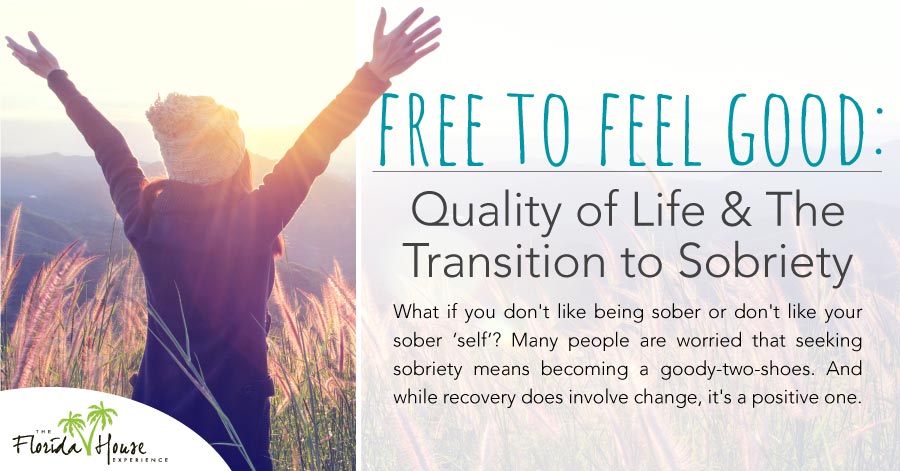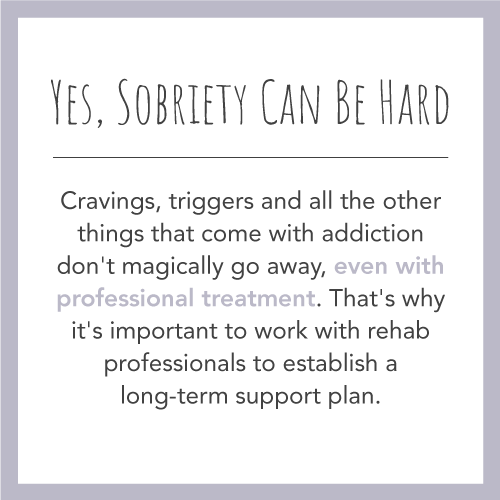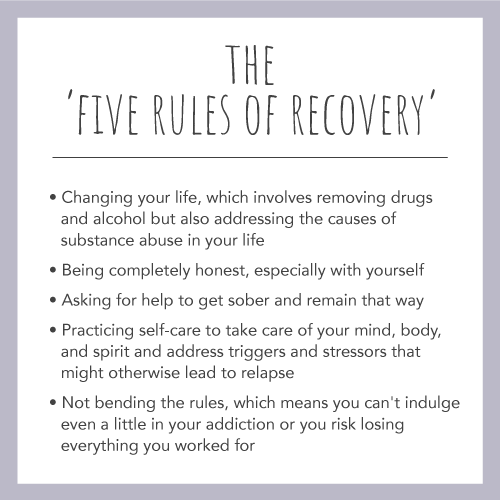
Sobriety can be scary, for many reasons. First, because rehab and recovery is not a simple or easy road, though it is a journey that’s possible for anyone willing to reach out for help and do the work. Second, recovery may seem like an unknown for individuals who have lived a life with drugs or alcohol for some time. What if you don’t like being sober or don’t like your sober self? Many people are worried that seeking sobriety means becoming a goody-two-shoes. And while recovery does involve change, it’s a positive one, and it can feel good. Here’s what you need to know about whether or not sobriety is worth it.
Yes, Sobriety Can Be Hard
 It would be dishonest to sing the praises of sobriety without mentioning some of the harder parts.
It would be dishonest to sing the praises of sobriety without mentioning some of the harder parts.
Cravings, triggers and all the other things that come with addiction don’t magically go away, even with professional treatment. That’s why it’s important to work with rehab professionals to establish a long-term support plan (also called an aftercare plan) that continues after inpatient or outpatient treatment. Studies have shown that aftercare, including groups such as Alcoholics or Narcotics anonymous, plays a pivotal role in successful sobriety. Peer support groups can also be a positive way to embrace sobriety.
Surrounding yourself with people who understand what you’re going through can help you find the ways a sober lifestyle feels good. Sober friends who know how to have fun are great companions as you seek ways to add excitement and entertainment to your life without turning to drugs or alcohol.
Your old friends and family don’t have to fall by the wayside, either. Although this is another area where honesty is important, those who have never struggled with addiction don’t always fully understand it. In fact, around one in five people say they would think less of someone they knew (even a loved one or friend) if they learned the person was in recovery from addiction. That’s not a happy thing to consider, and you may be worried about how people in your social circle will look at the newly sober you. Perhaps some people will think less of you. Perhaps some people will consider you the “downer” now that you don’t drink or do drugs with them.
But there’s definitely a flip side to this coin. Being sober lets you repair relationships that might have been damaged by drug or alcohol abuse. It also lets you approach new relationships without the weight of active addiction. You may find that you’re better able to nurture, grow and enjoy relationships. You will likely become a friend, coworker or partner that others are more able to trust and rely on, and the emotions that come from those situations can be as heady as the high that comes from substance use. Except positive interpersonal relationships tend to be a much healthier way to experience joy in life.
But It Can Also Feel Good
 Relationships aren’t the only thing that can bring you happiness while sober. But that happiness usually requires that you embrace the change that sobriety brings.
Relationships aren’t the only thing that can bring you happiness while sober. But that happiness usually requires that you embrace the change that sobriety brings.
In an article published by the Yale Journal of Biology and Medicine, author Steven M. Melemis writes about the five rules of recovery. He says they are:
- Changing your life, which involves removing drugs and alcohol but also addressing the causes of substance abuse in your life
- Being completely honest, especially with yourself
- Asking for help to get sober and remain that way
- Practicing self-care to take care of your mind, body, and spirit and address triggers and stressors that might otherwise lead to relapse
- Not bending the rules, which means you can’t indulge even a little in your addiction or you risk losing everything you worked for
It’s that fifth rule that probably causes the false goody-two-shoes impression of sobriety. But it’s not about being angelic all the time. You don’t have to be a stick in the mud to be a recovering alcoholic, for example. What you have to do is not break the rules that you know keep you from drinking.
Rule five doesn’t cover all the rules ever written; you can still be you. You can be a rebel, a party lover, an artist or anything else that you want so long as you figure out how to do it without drinking or doing drugs.
Yes, that’s not always easy. Many people at first wonder why they hate being sober, and it’s often because they rely on drugs or alcohol to be the fun for them. When you’re in long-term recovery, you have to do the work to learn how to be fun on your own.
Here’s the good news. When you figure out how to have fun without substances, you are:
- More likely to remember and enjoy the fun long-term
- Likely more fun for others to be around
- Better able to turn your passions and interests into hobbies or even careers
- Able to enjoy the moment without worrying about the consequences of substance abuse later
- More apt to live each day to its fullest because you aren’t putting effort into seeking the next high or hiding your drug or alcohol abuse
The bottom line is that being sober can feel good, but it’s a different type of good than a substance-induced high brings. It’s a safer, more permanent and deeper good. Hopefully, one you can enjoy for a long time.
Support Is Critical to Successful Sobriety
Most of the time, the good feelings that come with sobriety aren’t enough to get you there. Recovery can be a long road, and you might not experience the good feelings in the beginning. That’s why expert support is critical to successful sobriety.
If you’re ready to find out more about rehab and recovery, FHE Health is here to help. Call (855)441-2449 for immediate help and find out how to start working toward sobriety and all the worthwhile things that can bring.






